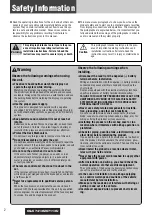
3
OpenAttendant
Program Overview
OpenAttendant
Program Overview
Using the OpenAttendant 205
(hereafter: OpenAttendant), you can
create information systems (voice
portals or voicemail systems) in
which calls are partially or totally
processed automatically. Callers nav-
igate through the individually de-
signed (voice) menus using the key-
pad on their telephones.
Announcement services for cinema
timetables, the weather, stock ex-
change tips, opening hours, special
offers or heads of a shared office are
just some of the possible applica-
tions for OpenAttendant.
You can configure up to five inde-
pendent systems (voice portals),
each with their own telephone num-
bers. You can also define different
reactions for each system in connec-
tion with OpenCom 100 time groups
(e.g. for handling day- and night-
time calls).
The OpenAttendant allows you to
protect selected menus and actions
in a voice portal using a PIN and in
doing so, make them accessible to a
certain group of users. This enables
calls to be diverted to a mobile tele-
phone for certain customers or se-
lected customers might be con-
nected directly to top management,
for example.
Announcements or music can be im-
ported into the system using a) a
system telephone or b) a PC . The lat-
ter requires a conversion program,
which is included in the scope of de-
livery (called the KDA Manager).
OpenAttendant is integrated into
the OpenCom 100 software. There-
fore voice portals can be easily con-
figured via the Web interface of the
configuration software. (They can
also be managed and saved with the
entire OpenCom 100 configuration.)
OpenAttendant runs on all
OpenCom 100 infocom systems
(OpenCom 105, 110, 120 and
OpenCom 130) from Release 5.0
onwards.
Announcements and music are man-
aged in audio files and are saved on
the OpenCom 100 memory card.
This is the same card as is used for
the OpenVoice voicemail system.
Both systems – OpenVoice and
OpenAttendant – can be operated
simultaneously. The two can make
equal use of the voice channels to
the memory card (four in total).






































